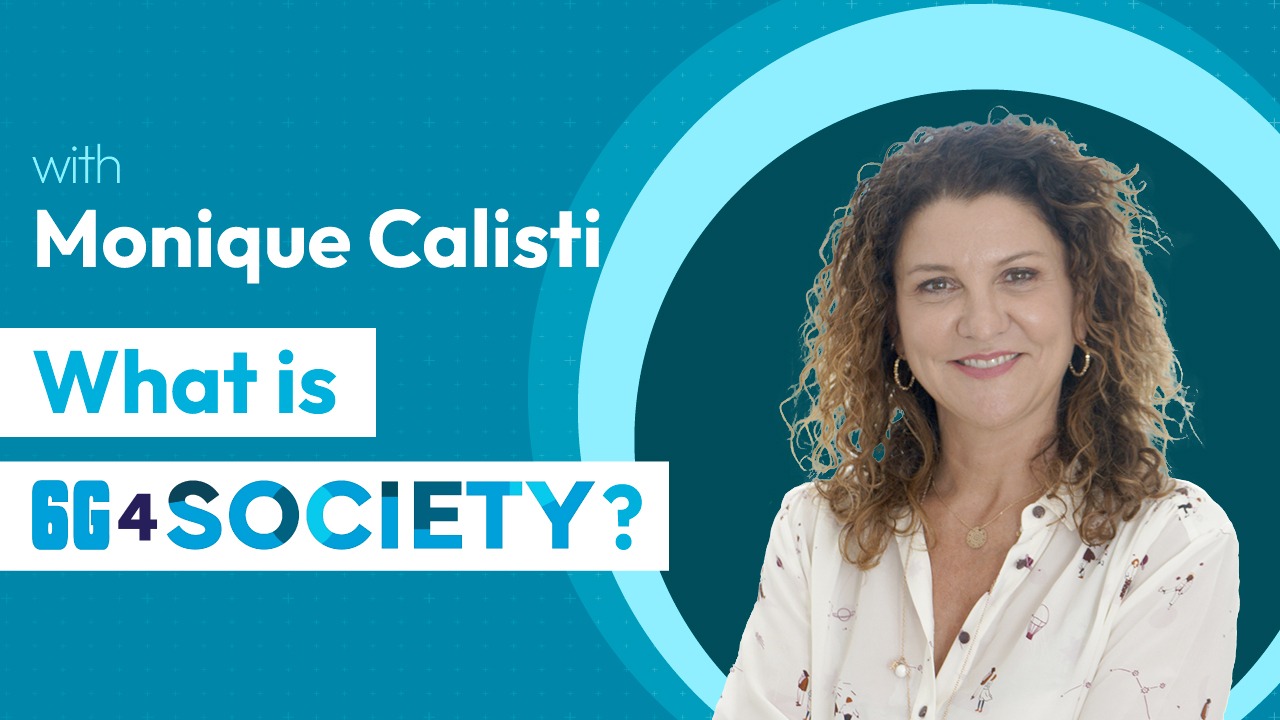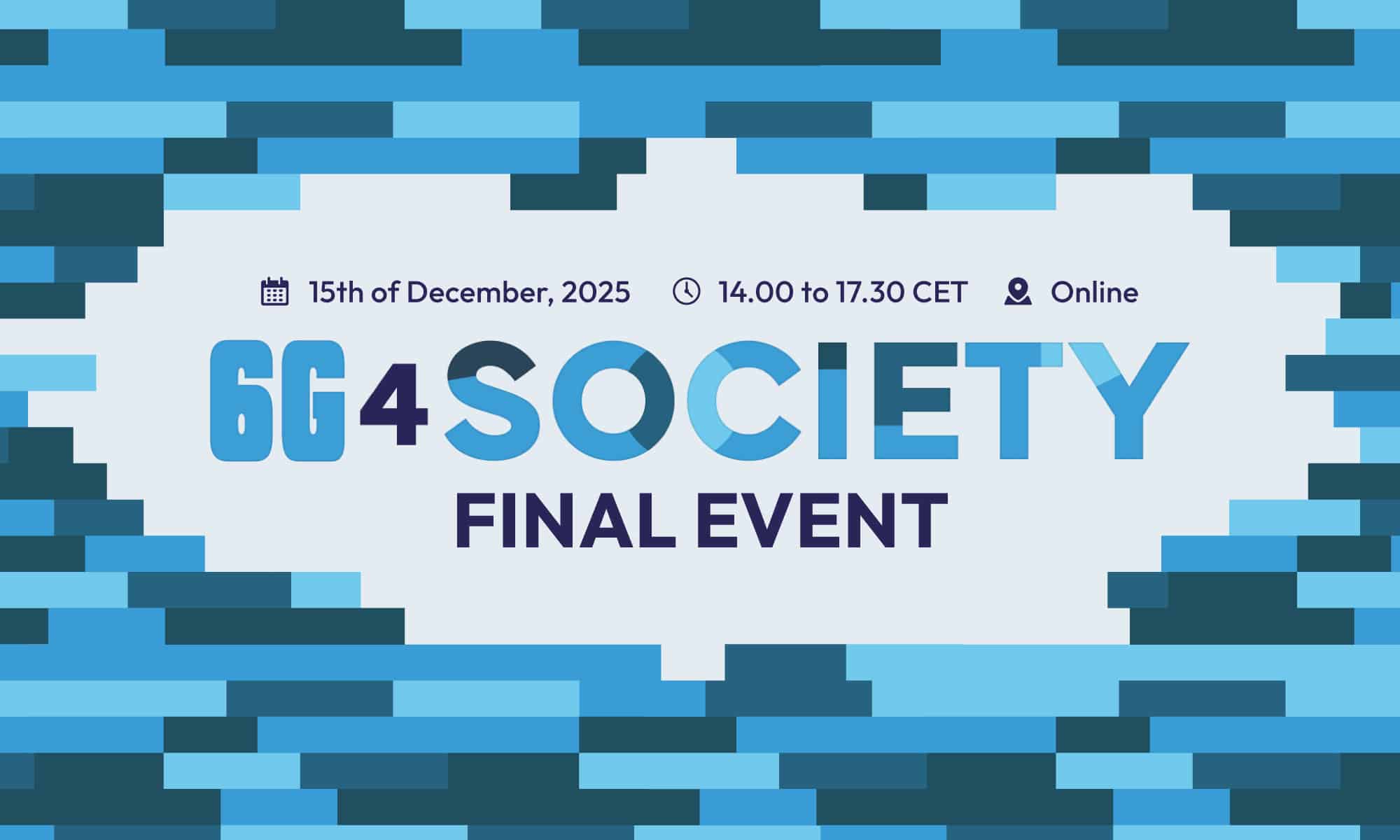
Get to know more about 6G4Society, our vision, our goals and our activities in our videos. All videos are also posted on our YouTube Channel



What is 6G4Society about?
How do you see sustainability shaping the development and the deployment of 6G?
In 6G4Society’s first interview, Project Coordinator Monique Calisti talks about what the project is aiming to achieve and what it will focus on over the next two years. She also explains the role sustainability will play in shaping the development and the deployment of 6G.
What is the green digital transition? What role does sutainability play into the devlopment of 6G? Why is the acceptance of technology important?
These are a few of the questions we address in the 6G4S Talks. Check out these interviews with experts to dive deeper into topics that bring a sociological perspective to technological development.
This engaging webinar explores how ethics, inclusion, and human-centered design can—and must—shape the development of next-generation networks. Hosted by the 6G4Society project, the session features members of the Dutch FNS 6G Ethics Board and dives into the importance of embedding ethical frameworks into 6G technologies from the outset. As Europe advances toward 6G deployment by 2030, the conversation highlights the need for a cross-disciplinary approach that goes beyond technical KPIs, introducing Key Value Indicators (KVIs) as tools for purpose-driven innovation. The session brings together experts from academia, policy, and civil society to reflect on how we can build digital infrastructure that serves sustainability, societal values, and true digital inclusion.
This insightful webinar, hosted by the 6G4Society project under the Smart Networks and Services Joint Undertaking (SNS JU), brings together leading experts from Finland and the Netherlands to explore how Europe is shaping the future of sustainable 6G. As the continent prepares for 6G deployment by 2030, the session examines the critical intersection of 6G, AI, and IoT, highlighting the technological, societal, and regulatory foundations needed to build a resilient and sovereign digital ecosystem. The discussion offers strategic insights, real-world examples, and collaborative perspectives for industry, policymakers, researchers, and innovators across Europe and beyond.
What does it take to ensure that 6G technology is accepted, trusted, and valued by society? How can projects integrate societal and environmental values by design? On 6 November 2024, Hexa-X-II and 6G4Society, two European Smart Networks and Services Joint Undertaking (SNS JU) projects, co-hosted a webinar where experts from both projects shared insights on building societal acceptance for 6G.
How can 6G technology drive societal, environmental, and economic sustainability? On 21 November 2024, the SNS JU 6G4Society project and FIDAL hosted a workshop to explore how Key Value Indicators (KVIs) are shaping a sustainable 6G future. Experts shared insights on defining, implementing, and using KVIs, addressing challenges, best practices, and expected outcomes. Watch the recording to discover how SNS JU projects are developing tools and frameworks for a connected, inclusive, and sustainable future.
As KVIs become further developed and integrated as key components of SNS JU projects, challenges have emerged around how to identify what is a good measure of a KV, and how these can look different for subjective and objective evaluations. Key to this is understanding how these approaches and instruments can be different from KPIs and what other methodological resources can be drawn upon in their development.
Understanding controversies is a critical step in promoting social acceptance. Controversies are not simply obstacles; they are part of society’s negotiation process over technological change. They reflect broader discussions about governance, power, values, and risk distribution. Engaging with these disputes allows us to anticipate concerns, address misinformation, and develop frameworks for a more responsible and widely accepted 6G deployment.



© 2024-2027 6G4Society | All rights reserved
Chiara Mazzone discusses the importance of making 6G technology sustainable by integrating environmental and energy efficiency considerations throughout the technology's lifecycle in the SNS JU's research and innovation projects.
What do we mean by “green digital transition”? How can the green digital transition and 6G help the three dimensions of sustainability? Ilias Iakovidis, Adviser of Digital aspects of green transition at DG CONNECT, European Commission delves into the three dimensions of sustainability, the nexus between the green and the digital transitions and explore how the next generation of connectivity can play a role in achieving sustainability goals with several concrete examples.
Ilias Iakovidis
Marja Matinmikko-Blue emphasizes the need to integrate economic, social, and environmental principles from the start of 6G development, and delves into how it can align with the UN Sustainable Development Goals.
At ACM GoodIT 2025, 6G4Society Project Coordinator Monique Calisti discusses how next-generation networks can empower citizens and address global challenges, while acknowledging the environmental costs of digital innovation. She emphasizes the importance of collaboration, inclusive design, and sustainability for a connected future.
What should guide 6G beyond speed and performance? Dr Monique Calisti highlights inclusion, sustainability, trust, and multidisciplinary collaboration as core pillars for future 6G strategies.
Dr Monique Calisti highlights the key achievements of the 6G4Society project, from citizen engagement and acceptance models to Key Value Indicators measuring trust, inclusiveness, and sustainability. A shift from faster networks to people- and planet-centric 6G.
Dr Monique Calisti outlines key policy actions for 6G, from embedding sustainability indicators and engaging citizens early to reducing the digital divide and supporting social and environmental progress.
Dr Monique Calisti explains how Key Value Indicators (KVIs), citizen engagement, and early policy alignment can shape responsible 6G development. A call for value-driven research, innovation, and regulation from day one.
Dr Monique Calisti shares four key lessons from the 6G4Society project, highlighting why technical performance alone is not enough. She explains the importance of public acceptance, diverse citizen priorities, holistic metrics, and multidisciplinary collaboration to embed societal and environmental values into 6G from the start.
In this interview, Prof. Johann M. Marquez-Barja (IMEC & University of Antwerp) shares his vision for a 6G future that puts people at the center. Speaking under the 6G4Society project of the Smart Networks and Services Joint Undertaking (SNS JU), he reflects on the shift from performance-driven goals to value- and sustainability-oriented design. He highlights the need to integrate the digital, physical, and human worlds, co-designing 6G with society to ensure trust, inclusiveness, and long-term impact. This conversation invites us to rethink connectivity and build networks that truly serve people and communities.
Katrina Petersen, Senior Research Consultant, Societal Value, Public Safety Communication Europe (PSCE), explores the concept of Key Value Indicators (KVIs), explaining how they can help us map where we can have impact, create a frame for value assessment and guide us in what we can create for value-driven innovation. Furthermore, she delves into how SNS JU projects can use them as a framework to measure their impact as well as a point of reflection on why measure these specifically.
In this video, Katrina Petersen from Public Safety Communication Europe shares key findings on Key Value Indicators (KVIs), acceptance, and sustainability. She highlights why aligning stakeholder values with the 6G community matters, the challenges of defining what KVIs should achieve, and the importance of involving social scientists and diverse stakeholders in technical projects.
This video offers a deeper look at how values, expectations, and context shape responsible 6G innovation.
Margot Bezzi from CyberEthics Lab. breaks down these crucial distinctions, explaining why social acceptance plays a key role in technological advancements. She also explains how 6G4Society is exploring these concepts, why this work is important and what outputs we are hoping to achieve in our project.
In this interview, Margot Bezzi (CyberSocial Lab) explains how 6G4Society approaches the social dimension of 6G, focusing on societal impact, values, and social acceptance. She introduces the Social Acceptance of Technology (SAT) framework and highlights the importance of integrating social sustainability, ethics, and stakeholder perspectives into 6G design from the earliest stages.
Flavia Margno, Communication and Sustainability Specialist at Digital for Planet, explains the central role of public engagement when developing a new technology such as 6G, and how becoming an active listener allows us to bridge the gap between citizens and decision-makers. She also delves into who 6G4Society is targeting specifically, and how the project is engaging with them.
In this video, Flavia Maragno from Digital for Planet shares key insights from public engagement activities within the 6G4Society project. She highlights why listening to citizens early matters, how people learn about emerging technologies, and what they expect from future networks.
The message is clear: people don’t just want faster networks; they want technology that protects their data, reduces digital divides, and aligns with environmental and societal goals.
Eleni Chamou from NOVA presents the KVI Ontology in the 6G4Society project, a framework to integrate societal values like trust, safety, and inclusivity into 6G technology. Learn how it links values, indicators, and KPIs to guide research, standardization, and decision-making in next-generation networks.